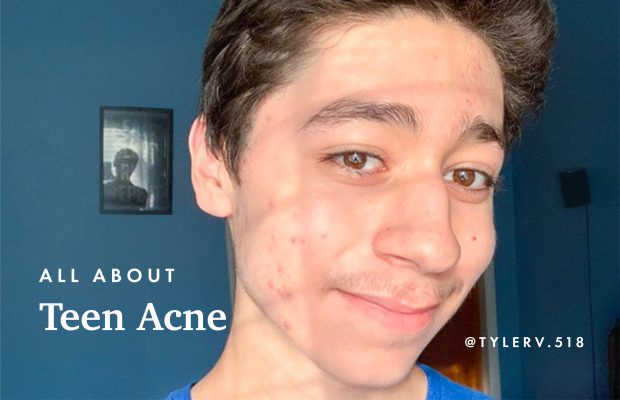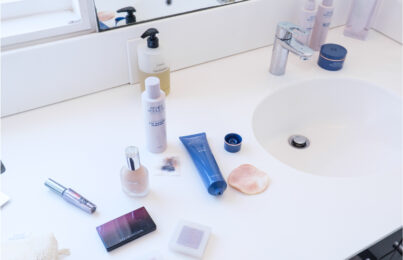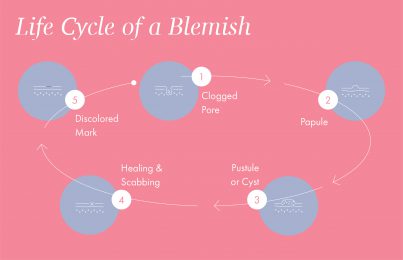Updated 07/10/23. To some, experiencing acne and blemishes for the first time during the teenage years may seem like a rite of passage and something that just needs to be “gotten through.” But as an esthetician, I believe it’s best to start getting on top of acne and clogged pores as soon as they start (especially since 85 percent of teenagers will experience acne at some point). Even if acne is mild, learning to take care of your skin during puberty will set you up with healthy skincare habits to last a lifetime. If acne becomes more severe, treating it early on can prevent potentially permanent scarring as well as unnecessary emotional distress.
Keep reading for my expert tips on managing teenage acne at any age.
Teenage Acne Vs. Adult Acne
While the breakouts that occur in your teens aren’t inherently different from breakouts you might experience as an adult, teens may need different factors to control their breakouts. Teenage acne is most often caused by an overproduction of oil brought on by hormones. Androgens, a group of sex hormones that can cause oil glands to become overactive, increase in both girls and boys during puberty.
This means that keeping skin clear and managing acne in your teens should focus on proper cleansing and oil control.
While teenage acne can be frustrating, the good news is that teen skin is more resilient than adult skin. It has a higher rate of skin cell turnover and heals more rapidly. The fact that teens produce more oil than adults helps keep their skin’s natural barrier protected, making them less prone to irritation.
Learn more about the science behind breakouts and why they form.
Best Products for Managing Teenage Acne
As I mentioned, managing teenage acne should focus on proper cleansing and oil reduction. That said, younger, pre-teen skin should be handled somewhat differently than teenage skin on the older end of the spectrum. I’ve broken down the best products and routines for managing teenage acne by age group.
Note: Due to the nature of their hormones, boys often experience a more severe onset of teen acne than girls. That said, boys are also more likely to recover from their acne during their teens whereas girls are more likely to carry their acne into adulthood. (No fun, girls!)
Acne at Ages 11-14
The first signs of acne often start to appear with the onset of puberty, which typically happens between the ages of eleven and fourteen (or even earlier for some). These first signs of acne usually manifest as congestion, meaning clogged pores (little bumps under the skin) and blackheads in the t-zone. Since acne is usually still mild at this stage, it’s a good time to get on top of it.
The challenge with this age group is that the skin is still very young and often resembles childhood skin more than adolescent skin. This means it needs to be treated gently without the use of overly harsh or active ingredients. My best advice for this age group is to establish a simple, consistent skincare routine and stick to it. Not only will this help keep acne under control, but it will also establish healthy skincare habits that will serve you for life.
Cleanser
The ideal cleanser for someone in this age group would be something gentle and free of SLS (a harsh sulfate that can dry out the skin), synthetic fragrance, or drying alcohols. I recommend either a gel or lotion cleanser. Be sure to cleanse both morning and evening as well as after sports or activities that make you sweat a lot.
Toner
Using a hydrating, alcohol-free toner with soothing properties after cleansing is a great way to make sure any remnants of cleanser are removed to keep pores clean.
Moisturizer
Get in the habit of using two moisturizers: one without sunscreen for nighttime and one with sunscreen for daytime. It’s thought that 80 percent of a person’s sun exposure occurs before the age of eighteen, so if you can lock this habit down early on, your skin will be thanking you for years to come! I recommend a lightweight, oil-free moisturizer for nighttime and a moisturizing sunscreen for daytime.
Spot Treatments
Spot treatments are a great option for someone experiencing blemishes at this age. The benefit is that you don’t use drying acne treatments all over the skin and risk causing irritation, you just get treatment where you need it. I recommend something like my Night Time Spot Lotion to help dry up surface whiteheads FAST.
Manual Scrub
If you’re seeing a lot of congestion, you can introduce gentle, physical exfoliation a few times a week using a well-formulated facial scrub. Just be sure the beads used in the scrub are round and non-abrasive. (Look for ones with jojoba beads which are round and they glide across the skin nicely without creating micro-tears to your infected breakouts.)
Acne at Ages 15-19
Around age fifteen is when acne often starts to become more severe in teens. This is also when sebaceous glands are kicked into overdrive, so you really want to start focusing on products that help with oil reduction. This is also the age at which I typically start to recommend chemical exfoliation.
Cleanser
I recommend using a cleanser with either exfoliating or oil-absorbing elements. AHA/BHA Blemish Control Cleanser combines chemical exfoliation with a gentle physical exfoliant and is one I recommend to many people in this age range. Rapid Response Detox Cleanser is another good option that includes antibacterial properties as well as oil-minimizing ingredients. Be sure to cleanse both morning and evening as well as after sports or activities that make you sweat a lot.
Toner
Traditional astringent toners often include drying alcohol and can strip the skin doing more harm than good. Instead, I suggest a hydrating, oil-free toner with antibacterial properties to balance the skin.
Vitamin C Serum
Using a vitamin C serum under your sunscreen in the morning will provide great antioxidant benefits to protect from UV damage. In addition, a vitamin C serum can be very beneficial to teenagers experiencing acne because it will help inhibit the pigmentation that causes lingering acne scars.
Night Time Serums
Salicylic acid (BHA) is an acid (chemical) exfoliant and a key ingredient to look for. It’s oil-soluble, meaning it can get inside the pores to clear them out and curb oil production. A salicylic acid serum works well for clearing congestion and eliminating superficial acne such as whiteheads, pustules, and papules (as opposed to deep nodules and cysts that stay under the skin and never come to a head). Learn why I prefer exfoliating acids in serums instead of acid toners.
To avoid over-exfoliating, I recommend alternating your salicylic acid serum with a hydrating serum to support the skin’s moisture barrier and immune function.
Moisturizer
When someone produces a lot of oil, their instinct is often to use products that dry out the skin and skip using moisturizers. This can leave skin dehydrated and flaky, and your skin will become even oilier trying to compensate for the lack of hydration. Moisturizing is especially important for those treating their blemishes because it offsets the dryness caused by many acne-fighting ingredients. Use a light, oil-free lotion like Skin Recovery Lotion. If you’re extremely oily, you can also opt for a mattifying gel moisturizer.
Be sure you use a moisturizer in the morning that contains an SPF of at least 30. This is crucial for preventing those red and dark post-breakouts marks that can linger for months.
Masks
Masks can be a great skincare addition for teens and are a useful tool when it comes to managing your acne. A hydrating, antibacterial mask can be used any time breakouts are flaring up. For those with very oily skin and congested pores, try a gentle clay mask that includes hydrating ingredients beforehand.
Additional Tips for Managing Teenage Acne
Establishing a consistent routine is the best thing you can do to manage acne, but these few other tips can also make a big difference.
Consider When to See a Dermatologist
If you’re experiencing severe acne, especially nodular or cystic acne (hard, painful lumps that don’t come to a head), it’s a good idea to consult with a dermatologist. Because they occur so deep within the skin, cystic and nodular acne are most likely to leave permanent indents and scarring. A derm may prescribe products such as a retinoid to help regulate skin cell turnover and prevent clogged pores or benzoyl peroxide. Benzoyl peroxide can also be found over the counter and used as a treatment on areas where red, infected blemishes are present.
Always Wash Your Face After Exercising
Because keeping the skin clean and free of oil and bacteria is key, cleanse your face any time you work out or sweat (in addition to morning and evening). Focus especially on cleansing areas where sweaty sports equipment rubs up against the skin. This will help prevent breakouts from forming in the first place. Learn more about how to care for your skin when working out.
Change Your Pillowcases
Change your pillowcases often to avoid reintroducing oil and bacteria to the skin.
Treat Body Acne as Diligently as Acne on the Face
Many teenagers can develop acne on the body as well as the face. Learn how to manage body acne.
Don’t Use Bar Soap
When used to wash your face, the ingredients that help bind bar soap together lower the pH of your skin and can cause dryness or even irritation over time.
Don’t Pick!
As tempting as it may be, this is a habit you’ll want to kick early on. I’ve seen picking cause a lot more damage to people’s faces than acne ever could. If you have clogged pores or blackheads that need to be removed, it’s always best to schedule a facial and see a professional for extractions. Learn the benefits of a facial for teenagers.
I hope you found this post helpful! Navigating acne for the first time can be confusing for teenagers and parents alike. But trust me—spending a little time and effort upfront to establish a consistent skincare routine will benefit you so much later on. If you’re still struggling to find a routine that’s just right for you, you can book a virtual consultation with one of our in-house estheticians.
Celebrity Esthetician & Skincare Expert
As an esthetician trained in cosmetic chemistry, Renée Rouleau has spent 30 years researching skin, educating her audience, and building an award-winning line of products. Her hands-on experience as an esthetician and trusted skin care expert has created a real-world solution — products that are formulated for nine different types of skin so your face will get exactly what it needs to look and feel its best. Trusted by celebrities, editors, bloggers, and skincare obsessives around the globe, her vast real-world knowledge and constant research are why Marie Claire calls her “the most passionate skin practitioner we know.”



